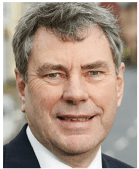With debates about the future of Sláintecare sparked by recent resignations, David Lynch asks doctors what they think the next steps should be for the health strategy.
Since its publication in 2017, the Sláintecare healthcare strategy has probably never had more media and political attention.
The wide-ranging 10-year plan to achieve a universal single-tier health system has been constantly in the headlines since Ms Laura Magahy, the Executive Director of the Sláintecare Programme Office, and Prof Tom Keane, the Chairperson of the Sláintecare Implementation.
Advisory Council (SIAC), both resigned in early September citing concerns over implementation.
The Minister for Health Stephen Donnelly has since said that a new board is to replace the outgoing SIAC and it will be co-chaired by HSE CEO Mr Paul Reid and the Secretary General at the Department of Health Mr Robert Watt.
In July 2019, the Government approved the creation of six new regional health areas (RHAs) as part of reforming the health service. The plan has caused tension between the SIAC and the Minister (see panel below).
This tension was first highlighted in the Medical Independent (MI) back in early May when this newspaper reported that, at its December 2020 meeting, the SIAC strongly disagreed with the Minister’s view that progressing the new RHAs should be postponed as a result of the Covid-19 pandemic.
In the face of recent sustained opposition criticism, Minister Donnelly has pointed to the latest Sláintecare mid-year progress report, which “details a total of 112 deliverables for the first six months of this year. Of those 112 deliverables, 109 are either on track or have been progressed”.
“Given what our health service has faced in the last 18 months, this is remarkable progress and a fantastic testament to the hard work and dedication of staff right across the Department of Health, the HSE, and all of the partner organisations who work together to deliver Sláintecare,” Minister Donnelly said last month.
Doctors that MI contacted voiced support for the central aims of Sláintecare. However, they remained sceptical with the pace of implementation and concerned by recent high-profile resignations.
Clare GP and former Independent TD Dr Michael Harty has been part of the Sláintecare story from the very beginning. As a member of the Future of Healthcare Committee, he was one of the central authors of the original report, which was published in May 2017.
No longer in politics, Dr Harty described himself as “very frustrated at the way it has been handled”.
“It’s now four-and-half years since the Sláintecare report was published and things are worse now than they were four-and-half years ago and they are only going to get worse unless Sláintecare is implemented in its entirety,” he told MI.

Dr Michael Harty
Dr Harty said the regionalisation of the health system is fundamental to the success of the project and expressed concern about delays in rolling out the RHAs.
He also insisted that at the commencement of the strategy, the Sláintecare office should have been placed in the Department of the Taoiseach rather than in the Department of Health.
“We saw from the very beginning, if Sláintecare was placed within the Department of Health it wouldn’t have the same political clout,” he said. He noted that it took the Government 14 months to respond to the original Sláintecare report and then that response “was a substantially different action plan”.
Asked whether the political will is there to successfully implement Sláintecare, Dr Harty said: “I don’t know.”
“I would be doubtful that it is there, in terms of what Sláintecare [originally] envisaged. Because Sláintecare was not an à la carte menu; it was a very integrated, comprehensive piece of reform and it was not something that you
could take this bit or that bit and ignore other bits.”
His concerns go beyond regionalisation. “The are other things that have not been done,” he said.
“We don’t have a unique patient identifier, that was promised. That would be a huge benefit to streamline the service. We don’t have a single digital healthcare record. We looked internationally far and wide in the Sláintecare committee to look at health services that were successful in integrating care and delivering a single-tier service and those two [measures] were essential, and if you don’t have them you really aren’t going anywhere.
“So pouring money into the health service without substantial reform is really just doing more of the same and expecting a different result… extra money without reform is probably money poorly spent.”
One of the implicit promises of the plan is that it will improve the Irish health service to make it more attractive for doctors to stay in Ireland and work in the system. Thus, the progress of Sláintecare, or lack thereof, is being followed by members of Ireland’s medical diaspora.
Abroad
“I have been watching the discussions around Sláintecare keenly from afar,” Dr Mary Ní Lochlainn, a Specialist Registrar in Geriatric and General Internal Medicine working in the UK, told MI.

Dr Mary Ní Lochlainn
“It is without a doubt that the decisions around Sláintecare and the plans made will have a huge influence on the decision-making of those of us abroad, when considering whether or not to return home in future.
“As someone working in the NHS in the UK, the idea of doing purely public work is perfectly acceptable and appealing to me. I am content with the prospect of purely public work and would rather live in a country with equal access to healthcare irrespective, rather than the current two-tiered system.”
However, Dr Ní Lochlainn said that the details of the proposed Sláintecare consultant contract appeared “to have a lot of worrying elements to it, which I have been hearing about from peers, the media and on Twitter”.
“As someone who has always picked up extra locum shifts here and there when saving for something, I find the idea that I cannot earn any additional money, in my personal time outside of working hours, infantilising,” she said.
“I am deeply concerned about the prospect of being moved to another hospital and what that lack of stability would mean for my family. One of the reasons I left Ireland was the prospect of moving away from loved ones every year during training. When you have a family member or spouse or partner with health problems, this is untenable, and I speak from personal experience.”
However, she added that most of these issues “appear to be easily resolvable”.
“However, I have also heard the Government have stated that the contract is non-negotiable, which is not very constructive. How will the aims of Sláintecare be achieved without a major recruitment drive of consultants?”
Dr Ní Lochlainn also said she was concerned about the recent resignations from SIAC, “which appears indicative of serious feasibility issues.”
But she noted that despite that “negativity” she agreed “that the Irish healthcare system needs reform”.
“I feel privileged as both a doctor and a patient to live in a country [the UK] with universal healthcare and I look forward to such a system existing in Ireland – having trained in such a system I have seen first-hand how well it can function, for healthcare workers and patients alike. I am hopeful that the Irish Government will engage meaningfully with doctors in Ireland in order to progress this dream.”
Deep End
With its promise of a universal single-tier system Sláintecare has won praise from some doctors working in disadvantaged communities. However, recent developments have sparked worry.
Prof Susan Smith, Associate Professor in the Department of General Practice at the RCSI, and a member of the ‘GPs at the Deep End’ group told MI that GPs are concerned with some of the Sláintecare news over the past month.
“GPs working in disadvantaged communities, who are part of Deep End Ireland, were really disappointed to hear of the recent Sláintecare resignations,” she said.

Prof Susan Smith
Prof Smith added that the high-profile resignations suggest that “the programme is in serious difficulty”.
“The Sláintecare reforms included plans to deliver a health system with universal access to care, based on need and not ability to pay,” she added.
“There was also a strong emphasis on resource allocation based on need, which can address the higher healthcare needs of people living in disadvantaged communities.”
Prof Smith said that there was now an onus on political leadership to push the health plan forward. “There is an urgent need for the Taoiseach and Government leaders to outline their commitment to Sláintecare and to be clear exactly how they will support its implementation.”
Bureaucracy
Prof Orla Hardiman, Consultant Neurologist and Professor of Neurology at Trinity College Dublin, also described the aspirations of Sláintecare as “admirable”.
“I fully agree that we should aim to have a single-tier health system in which access is free at the point of care, that care is provided based on need rather than ability to pay, that low complexity services and procedures should be administered as close to community as possible, and that more complex services and those for rare conditions that require extensive multidisciplinary team involvement should be centralised,” she told MI.

Prof Orla Hardiman
However, Prof Hardiman said that she also “worried” as to whether “there is a real appetite for this sort of radical change across the healthcare landscape”. “I don’t think one can blame any one sector; there are many points of resistance to change.
“The most important driver will be the cross-party political will, which, as far as I can see, is not as strong as it might be.” Describing her own experience as lead of one Sláintecare innovation programme (on headache), Prof Hardiman said the “process was extremely administration heavy, with a lot of bureaucracy that was really not necessary”.
“Also the current system of new service development, which I presume would be eventually subsumed into a change management programme were Sláintecare to truly become operational, is not at all joined up,” she added.
“Different projects and initiatives across the HSE don’t seem to cross reference very well, and there seems to be a lot of duplication and last minute requests for data that should take weeks or months to generate and present in a robust manner. The absence of a multi-annual budget across the sector is a major problem as it is very difficult to develop projects incrementally, which is how we should be doing things.”
The most important driver will be the cross-party political
will, which, as far as I can see,
is not as strong as it might be
Prof Hardiman said the “HSE seems to have been outsourcing to management consultants in the past couple of years”.
“This seems to be a very expensive way to address problems when all of this expertise should already be within the Department of Health, which is supposed to be driving policy, and the HSE, which is supposed to be implementing policy.”
Looking at what next steps should be taken, Prof Hardiman said care needs to be delivered as close to the community as possible.
“That means in the first instance providing resources to GPs to access diagnostics,” she explained.
“We should start to look at universal access to healthcare at the first point of contact. This should be done incrementally, but in the longer term it is more efficient to invest in primary care.”
Prof Hardiman emphasised the importance of political will, multi-annual budgets and investment in “projects that link secondary to primary care services”.
A rolling regional crisis
In early May, the Medical Independent (MI) reported on tension between the Sláintecare Implementation Advisory Council (SIAC) and the Minister for Health. In our lead story ‘Sláintecare Council opposes Donnelly’s halt on regionalisation’, MI outlined that differing points of view on the timetable of regionalisation were raised at SIAC meetings late last year.
The promised reorganisation of the health system into six regional health areas (RHAs) is not an unimportant aspect of the 10-year health plan, but “essential”, one of the original framers of Sláintecare told MI.
“Sláintecare was essentially about population-based health and delivering patient-centred services based on population catchment areas,” said Dr Michael Harty.
“That is where the regionalisation came in because we believed in [the] Sláintecare [committee] that the HSE was too centralised and it was unwieldy and very difficult to develop a responsive health service; it was just too slow to react to the needs of patients.” He said the plan for the RHAs “took a bit of work and that was finally agreed back in June 2019…and the Minister [for Health] at the time, and the Government at the time, adopted it as policy”.
“So it was quite disappointing, to say the least, when it has come out over the last few weeks that there was apparently a resistance identified by the advisory council to regionalisation.”
“It [regionalisation] was one of the main frameworks or reforms of Sláintecare. We saw little benefit in pouring more money into a system that was patently not working. Regionalisation was about getting over that substantial blockage or over-centralisation of the HSE.”
Writing in the last edition of MI, IHCA President Prof Alan Irvine said his Association “has long supported the restructuring of healthcare services to ensure greater alignment between community and hospital services”. He described the current system as “excessively centralised”.
“To work effectively, all hospital and community health services should be merged into one organisation within specific geographic areas. We need to move away from a ‘command and control’ model to one that supports and enables flexibility and responsiveness at a local level. That capacity to flex and local empowerment to plan has worked successfully during the past 18 months of the pandemic and needs to be fully embraced for the future.”
Prof Orla Hardiman told MI that she agreed that the HSE is “excessively centralised and that regionalisation should be pursued”.
“We should have ‘hubs and spokes’ with major hospitals in each region providing good quality services. The budgets for hospitals and community services should not be separate,” she added.
The cost of changing the system
With the focus on resignations, restructuring, and regionalisation, it could be easily forgotten that the funding of the Sláintecare vision remains one of the biggest challenges. Since its original publication in 2017, have the projected costs of the plan been consistent? “I’m not aware of any significant changes to the overall cost estimates, although there has
been some confusion in relation to these,” Dr Brian Turner (PhD), Department of Economics, Cork University Business School, University College Cork (UCC) told the Medical Independent.
“The Sláintecare report said it was going to cost €2.8 billion over 10 years, which was a rather unusual choice of phrasing.” “The plan envisages that, by the end of the 10-year timeframe of the plan, we would be spending
€2.8 billion per annum more than at the start of the plan, over and above the increases in spending arising from medical inflation and demographic pressures, for which the report was allowing 3 per cent per annum.” Dr Turner said he thought that this 3 per cent was “a bit conservative”.
“In relation to funding in the upcoming budget, I would expect to see some funding ring-fenced for Sláintecare implementation,” he said. “There was a significant amount of money allocated for it last year, but listening to the Oireachtas Health Committee proceedings this morning [on Wednesday 6 October], it sounds like some of
that will be unspent by the end of the year.













Leave a Reply
You must be logged in to post a comment.